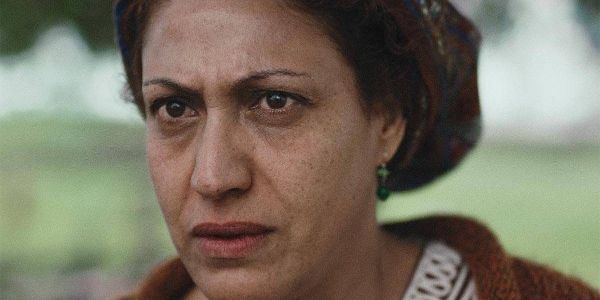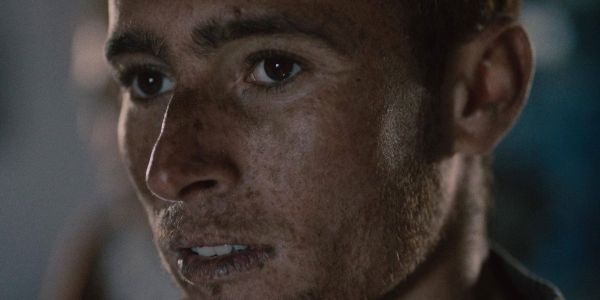BROTHERHOOD: Family & Society In Crisis
Rose is a freelance film critic who has written for…
Meryam Joobeur‘s award-winning short film Brotherhood examines the microcosmic experience of an isolated farming family, living in the Tunisan countryside in the context of the current Syrian conflict. This international co-production is surprisingly and densely packed in its twenty-five minute run time, and with strong performances from professionals as well as non-actors means not a single one of those minutes is wasted.
A Family In Conflict
When Malek (Malek Mechergui), the eldest son of a proud farming family returns after being away for a number of years, with a young Syrian bride Reem (Jasmin Lazid) and no explaination, the tensions that have been bubbling under the surface rear their head with unforeseen consequences. While his mother (Salha Nasraoui) welcomes the return of the child she thought was dead, albeit hesitant to fully accept his bride, Malek’s father Mohammed (Mohammed Houcine Grayaâ) is hostile towards a son that has betrayed by going to fight – potentially on the side of the Islamic State, although this never entirely clarified.

In the small, cosy living space, over a meal of lamb that Reem does not eat, the tension erupts. Mohammmed accuses his eldest son of abandonment, disappearing from his duties and laying the blame for a wolf attack on the youngest child Rayenne (Rayenne Mechergui), who was left by himself when the middle son Chaker (Chaker Mechergui) had to help his father with the sheep. When Malek offers to fix the broken fence, his father immediately rejects his offer of help, despite the fact they have lost a sheep already.
Here, conflict overrides common sense, and Mohammed’s stubbornness automatically pitches Malek as the enemy, someone who cannot provide or care for the family he so readily abandoned. This places him in contrast to his mother, who in a previous conversation stated that she is simply glad that her son she thought might be dead, has returned. This feeds into the theme of the inverse “Prodigal Son” story – here it is the father who is displeased by the return of the wayward son, fighting against his reacceptance into the family home once again.
The Art of Condensing a Narrative
What is impressive about Brotherhood is how Joobeur is so skillfully able to incorporate so much into the twenty-five minute runtime. Here, she presents a story about masculinity, conflict, religion and the current issues affecting Tunisia, and the lives of a small farming family in less than half an hour, without the story feeling undernourished, or missing a key element.
There are no lengthy chunks of exposition here; instead Malek’s mother sits in front of the television, shelling peas silently when a news bulletin mentions the issue of young men returning from Syria, crossing the borders and evading detection from the state – and it is immediately clear that this is key to the story, before any mention of Malek in the narrative.
The camera focuses tight on her face as the diegetic sound of the new pundits carries over the small room. Nasraoui‘s expression is one of apprehension, of an unspoken fear that she will see her son one day on the news, that she will receive the news of his death or that he will never return home. There is an argument to be made that Brotherhood captures the epitome of the saying “show not tell” – what can be explained is never as powerful as what is implied in actions, in the minutia of a performance.

When Casting Non-Actors Pays Off
In an interview with We Are Moving Stories, Joobeur talks about how a complete chance meeting in the Tunisian countryside led to the first inkling of a film, when she met Malek and Chaker herding sheep while scouting for a location for another film.
Joobeur stated that the brothers immediately stood out, “the contrast of their unique faces filled with freckles” caught her attention and she stopped to speak them. When she later learned that a nearby village had had a surge of radicalisation following the Tunisian Revolution, the begins of Brotherhood began to take shape. Returning a year later, she found the boys and persuaded them and their younger brother to take part in the film.
The young actors are not wary of the camera, but fully embrace their roles in film that is sparse on dialogue almost to the point of silence. There is a sense of easy naturalism to their performances, as well as their off-screen relationships which creates an instant sense of siblings without having to waste time establishing their bonds. Contrasted with the strong performances from Nasrouai and Houcine Grayaâ that are tasked with some of the more dialogue heavily scenes, Joobeur finds a place in the pantheon of directors who can create impressive casts from a mix of professional adult and non-professional child actors – for further examples see Sean Baker‘s The Florida Project and Shaun Meadows‘ This is England.
With the news that Brotherhood is being adapted into a feature length film, it promises a strong feature debut for Joobeur following her success in TIFF in 2018. A powerful and thoughtful film, it tackles complex themes of family and conflict with a muted elegance.
What short film do you think should be made into a feature? Let us know in the comments!
Does content like this matter to you?
Become a Member and support film journalism. Unlock access to all of Film Inquiry`s great articles. Join a community of like-minded readers who are passionate about cinema - get access to our private members Network, give back to independent filmmakers, and more.
Rose is a freelance film critic who has written for Little White Lies, Screen Queens and Film Daze. She loves thrillers, great female characters, Al Pacino, and multilingual cinema.













